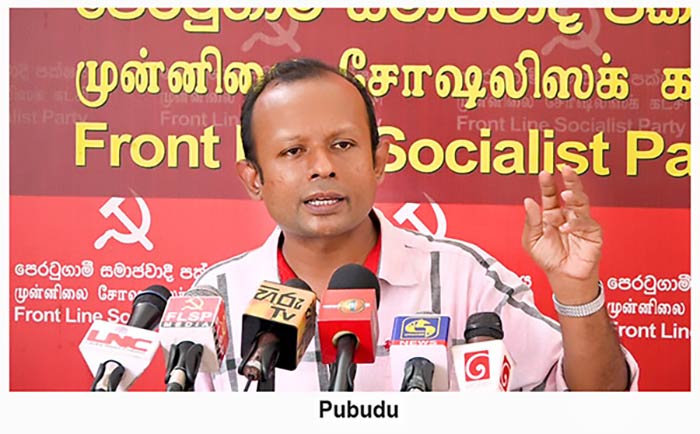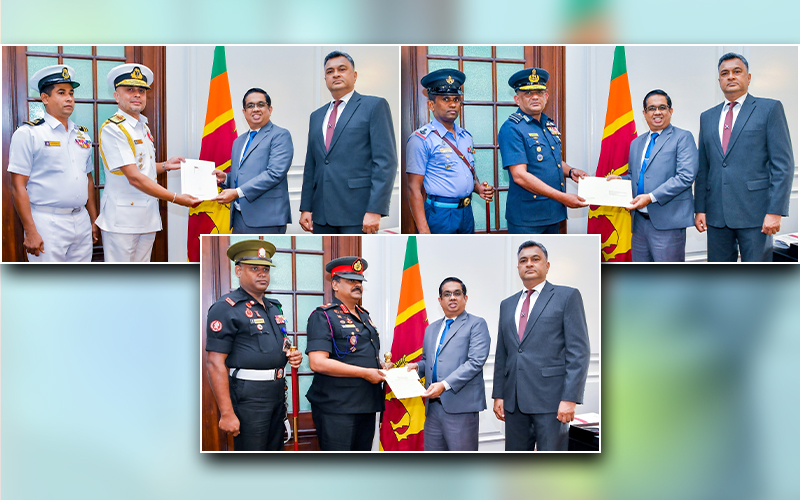News
Sri Lanka in sorry plight thanks to IMF, says FSP Education Secretary

By Rathindra Kuruwita
In the early 1990s, Sri Lanka had signed an international agreement undertaking to allocate six percent of its GDP for education, at a time when state revenue accounted for around 23 percent of GDP, Education Secretary of the Frontline Socialist Party (FSP) Pubudu Jayagoda said.
Jayagoda told The Island that in the 1970s, state revenue made up over 50 percent of the country’s GDP.
“Now, revenue has plummeted to around 12 percent, and a few years ago, it dropped to below 10 percent. The same individuals responsible for this decline are now lamenting the lack of funds for health and education,” Jayagoda remarked.
He attributed the decline in revenue to decisions made by successive governments to refrain from engaging in economic activities.
“In 1998, IMF representatives arrived in Sri Lanka and instructed the Chandrika Bandaranaike government to review taxes on foreign investors. This caused our state revenue to collapse. Ironically, the same IMF is now urging the government to increase state revenue to 15 percent of GDP. It’s absurd—the IMF’s advice reduced revenue to nine percent, and now they’re asking us to boost it,” he said.
Jayagoda added that the IMF had recently held a Zoom meeting on Sri Lanka.
“During the meeting, the IMF representatives insisted that international trade should face no barriers. They also advised against measures to protect domestic small and medium-sized enterprises, while advocating for the liberalisation of education, healthcare, and welfare programmes. Furthermore, they called for reforms to labour laws,” he explained.
The FSP Education Secretary warned that if Sri Lanka complied with these recommendations, its industries would collapse, leading to the loss of millions of jobs. Sri Lanka’s current crisis is a direct result of diligently following IMF recommendations, and that the country’s future looked bleak if it continues to heed IMF advice, Jayagoda added.
News
Navy seize an Indian fishing boat poaching in northern waters

During an operation conducted in the dark hours of 01 Jan 26, the Sri Lanka Navy seized an Indian fishing boat and apprehended 11 Indian fishermen while they were poaching in Sri Lankan waters, off Kovilan of Kareinagar, Jaffna.
The Northern Naval Command spotted a group of Indian fishing boats engaging in illegal fishing, trespassing into Sri Lankan waters. In response, naval craft of the Northern Naval Command were deployed to drive away those Indian fishing boats from island waters off Kovilan.
Meanwhile, compliant boarding made by naval personnel resulted in the seizure of one Indian fishing boat and apprehension of 11 Indian fishermen who continued to engage in illegal fishing in Sri Lankan waters.
The seized boat (01) and Indian fishermen (11) were handed over to the Fisheries Inspector of Myliddy, Jaffna for onward legal proceedings.
Latest News
Tri-Forces donate LKR. 372 million, a day’s pay of all ranks to ‘Rebuilding Sri Lanka’ Fund

Members of all ranks from the Sri Lanka Army, Sri Lanka Navy and Sri Lanka Air Force have collectively donated a day’s basic salary to the ‘Rebuilding Sri Lanka’ Fund, which was established to restore livelihoods and rebuild the country following the devastation caused by Cyclone Ditwah.
Accordingly, the total contribution made by the Tri-Forces amounts to LKR. 372,776,918.28.
The cheques representing the financial contributions were handed over on Wednesday (31 December) at the Presidential Secretariat to the Secretary to the President, Dr. Nandika Sanath Kumanayake.
The donations comprised LKR. 250 million from the Commander of the Army, Major General Lasantha Rodrigo; LKR. 73,963,879.71 from the Commander of the Navy, Rear Admiral Kanchana Banagoda and LKR. 48,813,038.97 from the Commander of the Air Force, Air Marshal Vasu Bandu Edirisinghe.
Secretary to the Ministry of Defence, Air Vice Marshal Sampath Thuyacontha, was also present on the occasion.
News
CEB demands 11.57 percent power tariff hike in first quarter

The Ceylon Electricity Board (CEB) has submitted a proposal to the Public Utilities Commission of Sri Lanka (PUCSL) seeking an 11.57 percent increase in electricity tariffs for the first quarter of 2026, citing an estimated revenue shortfall and additional financial pressures, including cyclone-related damages.
According to documents issued by the PUCSL, the proposed tariff revision would apply to electricity consumption from January to March 2026 and includes changes to both energy charges and fixed monthly charges across all consumer categories, including domestic, religious, industrial, commercial and other users.
Under the proposal, domestic electricity consumers would face increases in unit rates as well as fixed monthly charges across all consumption blocks.
The CEB has estimated a deficit of Rs. 13,094 million for the first quarter of 2026, which it says necessitates the proposed 11.57 per cent tariff hike. The utility has noted that any deviation from this estimate whether a surplus or a shortfall will be adjusted through the Bulk Supply Tariff Adjustment (BSTA) mechanism and taken into account in the next tariff revision.
In its submission, the CEB said the proposed revision is aimed at ensuring the financial and operational stability of the power sector and mitigating potential risks to the reliability of electricity supply. The board-approved tariff structure for the first quarter of 2026 has been submitted to the PUCSL for approval and subsequent implementation, as outlined in Annex II of the proposal.
The CEB has also highlighted the financial impact of Cyclone Ditwah, which it said caused extensive damage to electricity infrastructure, with total losses estimated at around Rs. 20 billion. Of this amount, Rs. 7,016.52 million has been attributed to the first quarter of 2026, which the utility said has a direct bearing on electricity tariffs.
The CEB warned that if external funding is not secured to cover the cyclone-related expenditure, the costs incurred would need to be recovered through electricity tariffs in the second-quarter revision of 2026.
Meanwhile, the PUCSL has said that a decision on whether to approve the proposed tariff increase will be made only after following due regulatory procedures and holding discussions on the matter.
By Sujeewa Thathsara ✍️
-

 Sports6 days ago
Sports6 days agoGurusinha’s Boxing Day hundred celebrated in Melbourne
-

 News4 days ago
News4 days agoLeading the Nation’s Connectivity Recovery Amid Unprecedented Challenges
-

 Features5 days ago
Features5 days agoIt’s all over for Maxi Rozairo
-

 Sports7 days ago
Sports7 days agoTime to close the Dickwella chapter
-

 News7 days ago
News7 days agoEnvironmentalists warn Sri Lanka’s ecological safeguards are failing
-

 News5 days ago
News5 days agoDr. Bellana: “I was removed as NHSL Deputy Director for exposing Rs. 900 mn fraud”
-

 Opinion3 days ago
Opinion3 days agoRemembering Douglas Devananda on New Year’s Day 2026
-

 News4 days ago
News4 days agoDons on warpath over alleged undue interference in university governance













